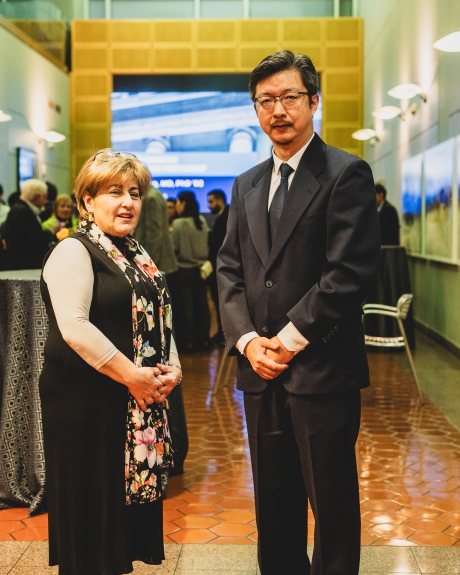Monumental advances in basic science are often the result of successful collaborations. These partnerships regularly occur between researchers, and in many instances, they flourish between a researcher and a donor. A collaboration sure to produce pioneering advances in molecular biology is the one between Blooomberg School of Public Health’s Jiou Wang, MD, BSPH ’02 (PhD), and philanthropist Elizabeth Walder, president and executive director of the Walder Foundation.

With generous support from the foundation, the Bloomberg School established the Walder Foundation Distinguished Professor in the Department of Biochemistry and Molecular Biology. It is the first time that the foundation has funded an endowed professorship and the first professorship in the department. Wang is the inaugural recipient.
When Walder, a 1982 graduate of the Johns Hopkins Krieger School of Arts and Sciences, was seeking to fund breakthrough science that has the potential to improve millions of lives, she turned to her alma mater. The pioneering work of Wang, a world leader in neurodegenerative diseases research, caught her attention. She discovered that they both have loved ones affected by neurodegenerative disease — including Walder’s 100-year-old father, who is living with Alzheimer’s — and was eager to champion a cause close to her heart.
“I was impressed with Jiou’s seminal discoveries, his collaborative approach, and his willingness to take on a leadership role in everything he does,” Walder says.
Neurodegenerative diseases, such as Alzheimer’s disease and dementia, are among the greatest public health challenges of our time. To develop strategies that could lead to new treatments, Wang is asking questions that get to the root of these diseases at the cellular level: What controls the birth and death of a protein? How do the shapes of DNA and RNA control their functions? And how do errors in these processes connect the causes and effects of neurodegenerative diseases — within cells and in the lives of patients?
An expert in biochemistry, genetics, and cell biology, Wang, over the last quarter century, has expanded on his groundbreaking research, working to discover the fundamental principles of what causes proteins to misfold, how that changes their role in the cell, and the ways cells can counter the toxic effects of these misfolded proteins. In another breakthrough discovery, Wang uncovered a mechanism by which the gene mutation linked to the most common type of ALS and to frontotemporal dementia leads to cellular defects associated with the diseases.
The professorship will afford Wang and his research team the opportunity to continue pathbreaking work.
“The support provided by the Walder Foundation Distinguished Professorship not only empowers me to take risks, but also reinforces the importance of pushing the boundaries of knowledge,” Wang says. “It also offers more students the opportunity to engage in exciting, high-stakes projects, nurturing their creativity and fostering a spirit of scientific adventure.”
This story was first published on the Bloomberg School of Public Health website. Read the full version
Topics: Alumni, Faculty and Staff, Foundations, Bloomberg School of Public Health, Fuel Discovery